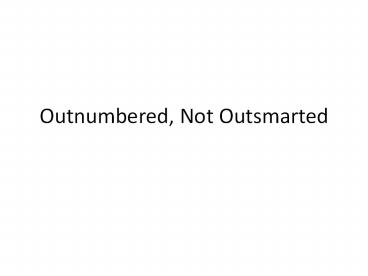Outnumbered, Not Outsmarted - PowerPoint PPT Presentation
1 / 25
Title:
Outnumbered, Not Outsmarted
Description:
Outnumbered, Not Outsmarted Atypical Pre-School Behavior The Impulsive Child Aggressive behavior i.e. biting, hitting Non-responsive to discipline Difficulty sitting ... – PowerPoint PPT presentation
Number of Views:21
Avg rating:3.0/5.0
Title: Outnumbered, Not Outsmarted
1
Outnumbered, Not Outsmarted
2
Atypical Pre-School Behavior
- The Impulsive Child
- Aggressive behavior i.e. biting, hitting
- Non-responsive to discipline
- Difficulty sitting even for short periods during
circle time - Jumping from one activity to another
- Nonstop talking
- Intruding on others play
- Unable to wait turn
3
The AD/HD Child
- Persistent pattern of inattention and/or
hyperactivity and impulsivity - More frequent and severe than other children at
comparable developmental level - AD/HD symptoms interfere with typical school
functioning - Very difficult to diagnose before 4 or 5
- Must have symptoms in multiple contexts
4
The AD/HD Child Social Features
- Difficulty sticking with a play activity, flit
from one to the next - Constantly on the go and into everything
- Looks as though the child is not listening
- May have low frustration tolerance and/or temper
outbursts - May be bossy
- Trouble following directions
5
Atypical Pre-School Behavior
- The Inflexible Child
- Perseverative play (stuck on the same script)
- Extreme difficulty transitioning from one
activity to another - Melt downs when routines are changed
- Unable to engage in imaginative play
- Unable to follow game rules
6
Atypical Pre-School Behavior
- The Disconnected Child
- Tone of voice is flat
- Little eye contact with others
- Little interest in others
- Unable to engage in reciprocal questioning
- Unable to go with the flow of others
7
The Child with Aspergers
- Severe and sustained impairment in social
interaction - Restricted and repetitive patterns of behavior,
interests, and activities - No clinically significant delays in language
- Appropriate cognitive development
- Like typical children, displays a curiosity about
the environment
8
The Child with Aspergers Social Features
- Lack of social or emotional reciprocity
- Nonverbal behavioral issues i.e. poor eye
contact, flat facial expression - Intense preoccupation with a singular focus i.e.
trains, bees to the exclusion of others - May exhibit odd motor mannerisms i.e. flapping of
hands - May have a staccato-like halt to vocal pattern
9
Atypical Pre-School Behavior
- The Socially Anxious Child
- Often has a blank facial expression may appear
frozen - Seems extremely uncomfortable, unhappy
- Has trouble initiating play
- Is hesitant to respond to direct questions
- Appears indecisive
- May isolate him/herself
10
Common Feelings
- Anxiety
- Frustration
- Inadequacy
- Anger
- Helplessness
- Hopelessness
- Determination
11
Common Pitfalls for Managing Atypical Pre-School
Behavior
- Bribes
- Threats
- Pleading
- Yelling
- Negotiating
- Punishment
12
Managing Impulsive Behavior
- Focus on the behavior you WANT not just the
behavior you dont want - Catch the child exhibiting positive behavior and
praise immediately - Shape behavior through praise
- Give one step directions
- Ask the parent(s) what works at home
- Redirect whenever possible
13
Managing Impulsive Behavior
- Let the kids know your expectations in advance
- Give choices
- Keep disciplinary statements short and sweet
- Use effective commands
- Make sure the child is paying attention before
you give the command - Give the command
- Wait silently for compliance
- Impose consequence if the command is not followed
14
Pit Stop to Practice
15
Managing Inflexibility
- Take the time to explain the rules of the game
clearly - Help the kids switch gears slowly
- Provide lots of encouragement
- Praise efforts and small achievements
- Offer clear choices whenever possible
16
Pit Stop to Practice
17
Managing the Disconnected Child
- Develop signal for eye contact
- Consistently offer opportunities to connect i.e.
page turner during story time - Give other options besides blunt expression
i.e. I want to play by myself instead of I
dont like you - Make it a game 3 cycles of reciprocal
questioning - Refer for professional help if needed
18
Managing the Socially Anxious Child
- Be as understanding, warm, and accepting as you
can be - Communicate that it is OK to speak when the child
is ready - Let the child and his classmates know that
non-verbal communication is all right too - Meet the child and parent before school in the
morning, engage the parent, and allow child to
simply observe
19
Managing the Socially Anxious Child
- Connect without pressure. Ask the child to help
you set-up activities - Use a matter-of-fact tone in response to the
childs speech - Make time for small group interactions
- Avoid direct questions which may provoke anxiety.
Make observational statements instead.
20
Pit Stop to Practice
21
Temper Outbursts
- Goal is NOT to eliminate all anger
- Goal is to learn better control and expression of
anger - Get to know your students buttons
- Avoid pushing buttons unnecessarily choose your
battles wisely - Use distraction
- Encourage self-control breaks
22
Helping Your Kids Cooperate
- Reward the whole class for positive interaction
- Stay away from punishing the whole class for one
childs misbehavior - Use the S.O.A.R. method!
- S Stop Action
- O Observe Aloud
- A Ask for Feedback
- R Reinforce Cooperation
23
Cooperation
- Help your kids tune in to their behavior i.e. Use
Thumbs Up Thumbs Down - Let the kids know your expectations of them ahead
of time - Describe the problem
- Use I messages
- Reverse the negative to positive ratio
24
Pit Stop to Practice
25
Social Skills Games to Play at School
- Roll the Ball
- Passing the Eyes
- Group Drawing
- Pop Up
- The Never Ending Story
- Freeze
- Are you my friend?






























![read[pdf] horse soldiers: the extraordinary story of a band PowerPoint PPT Presentation](https://s3.amazonaws.com/images.powershow.com/10136614.th0.jpg?_=202409230810)
